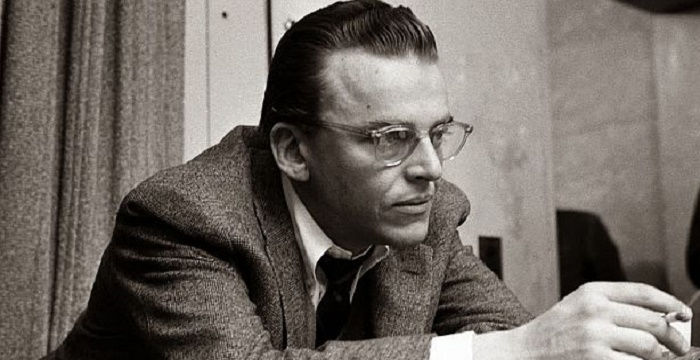
There are two strong reasons to welcome a revival of the musical Lolita, My Love, which is being staged at the York Theatre at Saint Peter’s from February 23 through March 3 as part of its “Musicals in Mufti” series.
First, it’s a reexamination of a story about the sexual relationship of a teenage girl with a middle-aged man — a pedophile — at a time when many powerful men are being outed for their conduct with subservient or underage women. Second, it’s a chance to hear a virtually-unknown score by one of the great songwriters in the history of Broadway, Alan Jay Lerner.
Lerner was the force behind this 1971 show. He left his successful partnership with Frederick Loewe, with whom he wrote Brigadoon, My Fair Lady and Camelot, and engaged the Academy Award-winner John Barry to compose the music. (Barry had written the scores for Born Free, The Lion in Winter, and eleven James Bond films.) Lerner wrote the book and lyrics and he coaxed the illustrious opera director Tito Capobianco to stage it.
The musical was based on the 1955 novel Lolita by Vladimir Nabokov, acclaimed by many to be the greatest literary work of the 20th century although others call it perverted.
Humbert Humbert, an aging English professor, becomes infatuated with the twelve-year-old daughter of his landlady, Charlotte, and he marries Charlotte to be near his mesmerizing nymphette. When his wife dies, Humbert and Lolita embark on a cross-country trip in his car. In Nabokov’s book, Humbert puts sedatives in her ice cream, then gives her money in exchange for sex.
Nabokov provided commentary on Humbert’s story. In Lerner’s musical, the absence of Nabokov’s authorial voice made the musical seem salacious, as Humbert described, and the audience saw, his lurid version of Lolita seducing him. The story was told entirely from Humbert’s perspective, which leads the audience to trust his version of events, and to identify with him.
That induced creepiness in 1971 and would be totally offensive today. In this new production, adapter Erik Haagensen used a Lerner re-write idea and switched the narrator to Humbert’s psychiatrist. Moreover, that doctor is a woman who pointedly says, “Did that really happen, or is it your imagination?” This version’s director also is a woman, Emily Maltby, who adds a feminist perspective.
If you recoil at this story, bear in mind that it has a strange fascination, and not only for men. Claire Armitstead, culture editor of The Guardian, wrote, “For a 1970s teenager, Lolita was glamorously erotic. I know I wasn’t alone in fantasising about what it might be like to be a gum-popping nymphet, whisked away on a road trip by a handsome literary sophisticate. Which of us didn’t have a crush on some crooner or actor? She is what many teenage girls dreamed of being.”
Humbert is intoxicated by language, uses word play and wry observations of American culture, plus references to Edgar Allen Poe who married a thirteen-year-old girl, which the erudite Lerner incorporated into the show. Lolita, My Love gives us a chance to hear songs by Lerner, which Haagensen calls “a brilliant score.” The music isn’t well known because the show closed after Philadelphia and Boston tryouts and never was commercially recorded.
The original show flopped because of the story, and chaos within the creative team. Capobianco, who collaborated with me on his memoirs, told me that there was recurrent improvisation. “In opera, you have a solid basic structure of words and music. In this, they were constantly changing the music, lyrics and dialogue. At each rehearsal they would show up with new ideas and new text. Every day, things were changed. Lerner said to my wife, ‘You must be happy your husband does most of his work with Verdi and Puccini, because they’re dead. Unfortunately for you, I’m alive.’”
Lerner was with his newest wife, the fifth out of eight women he married. She sat next to him at rehearsals and would give to him special white cotton gloves to prevent him from chewing on his fingernails. He’d take the gloves off, throw them on the floor and bite his fingers. An assistant would immediately hand him new gloves. During the preparation of Lolita, My Love the couple separated, then divorced. Lerner was getting shots of amphetamines and was extremely high-strung.
Lerner changed the girl’s age — twelve in the novel — to fourteen, hired a real fifteen-year-old to play her, and wrote a song titled “In The Broken-Promise Land Of Fifteen.” Lerner eliminated some details; he didn’t include the drugging and didn’t show the two of them having sex.
He looked for ways to make the show more entertaining, whereas Capobianco’s interpretation was darker. During the Philadelphia tryout, Capobianco made his unhappiness clear, and Lerner hired a new director and also changed choreographers.
Lerner wanted Richard Burton to play the leading man but settled for the British Shakespearian actor John Neville. Lolita was the little-known Annette Ferra. Producer Norman Twain described her character, “She’s full of crazy, kookie mannerisms, very cool.” Ferra said, “I’m the original flower child.” But after Philadelphia she was replaced by a more innocent-looking teenage actress. Dorothy Loudon was her mother, and Leonard Frey was Quilty.
The York production features Robert Sellas as Humbert, Caitlin Cohn (who is in her early twenties but looks very young) as Lolita, Jessica Tyler Wright as Charlotte, George Abud as Quilty and Thursday Farrar as Dr. Ray.